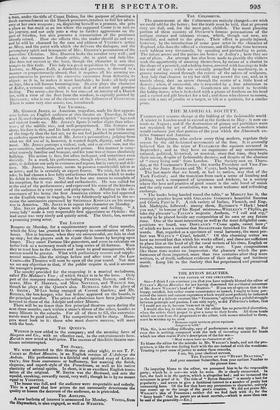THE BYRON BEAUTIES.
TO THE EDITOR OF THE SPECTATOR.
SIR—I think I can convince you that you have unjustly blamed the editor of FIN DEN'S Byron Beauties for not having discovered the accidental misnomer of Mr. JOHN WRIGHT'S head of "Beatrice." If you are of opinion that in the' happy, satisfied, but rather coarse countenance so named, I ought to have per- ceived the intent and earnest expression which would most probably be indicated in the face of a delicate creature like" Francesca," agitated by a painful struggle between principle and passion, I can only reply, as did Tilhurina's father, that "I could not see it, because 'twas not in sight." I would also beg to info, m you, that the editor has no permitted discretion, when the artists think proper to give a manic to their hearts. All those heads which are sent from the proprietors to the editor, with names attached to them, must be written up to, even Homan° capita eenieem pictor equinam J ungei e si 'att." This, Sir, is no trifling difficulty, easy of performance as it may appear: But even this is nothing, compared with the task of inventing names for heads which too often realize POPE'S description of the fair sex- " Most women bare no characters at all."
To blame the editor for the mistake in Mr. Witicur's heads, and not the pro- prietoi s, is like the tree finding fault with the axe instead of with the woodman. Trusting to your sense of justice to notice these remarks, I am, Sir, your obedient servant, THE EDITOR OF TI1E " BYRON BEAUTIES,"
And your constant Subscriber, from your earliest Number to
the present time.
(In imputing blame to the editor, we presumed him to be the responsible party ; which he is not—we wish he were. He is clearly exonerated. In tact, the fault is in the system, which is altogether bad; and we instanced the misnomer in proof of it. The title of " Byron Beauties" is merely a bait for popularity ; and serves to give a factitious interest to a number of pretty but unmeaning faces. Of the few that have any pretensions to character, scarcely one comes up to the image of the poet's creation. We did not praise Mr. WRIGHT'S idea of Francesca; neither did we find fault with it; for the "fancy heads" that he paints are at least mortals,—which is more than ma be said of the generality.—En.)


























 Previous page
Previous page